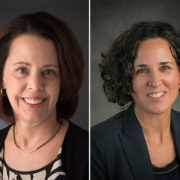Diana Hess and Paula McAvoy win education award for “The Political Classroom”
Winners say classrooms are ‘unusual political places’
Immigration. Gun control. Abortion. Gay rights. Religion. Are these and other polarizing topics too controversial to be discussed in today’s high school classrooms?
According to Diana Hess and Paula McAvoy, co-winners of the 2017 University of Louisville Grawemeyer Award in Education, teachers should encourage conversations about difficult political issues because that’s the very nature of a democratic education and those discussions help students understand diverse points of view and become more politically engaged adults.
Hess and McAvoy’s 2014 book “The Political Classroom: Evidence and Ethics in Democratic Education” explores the role of teachers in perpetuating serious, thoughtful political deliberation in schools.
Hess is dean of the School of Education at the University of Wisconsin-Madison where she also holds the Karen A. Falk Distinguished Chair of Education and McAvoy directs the Center for Ethics and Education at the same university.
The book is based on a four-year study of 35 teachers and their 1,000-plus students. Their analysis included 21 schools representing all points on the political spectrum. Hess and McAvoy provided compelling case studies that showcased the power of the deliberative process in helping students hone thinking, reasoning and communication skills as they examined the question: “How should we live together?”
“Teachers are beginning to worry that all controversial topics are taboo,” said education award director Marion Hambrick. “This timely book dispels that notion and provides tangible evidence that the classroom is an unusual political place where students can learn to carefully examine divisive issues.”
All 2017 Grawemeyer Award winners will be announced this week, pending formal approval by the university’s board of trustees. UofL presents the prizes annually for outstanding works in music composition, ideas improving world order, psychology and education and gives a religion prize jointly with Louisville Presbyterian Theological Seminary. The winners will present free lectures about their award-winning ideas when they visit Louisville in April to accept their $100,000 prizes.



